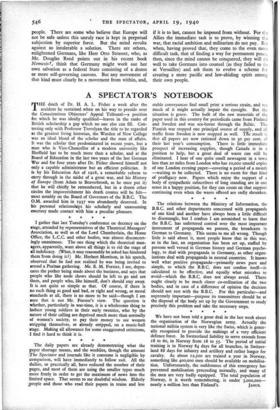The daily papers are already demonstrating what the paper shortage
means, and the weeklies, though the amount The Spectator and journals like it consume is negligible by comparison, will have immediately to follow suit. All the dailies, or practically all, have reduced the number of their pages, and most of them are using the smaller types much more freely in order to get the maximum of news into the limited space. That seems to me doubtful wisdom. Elderly (people and those who read their papers in trains and less stable conveyances find small print a serious strain, and too much of it might actually impair the eyesight. But the situation is grave. The bulk of the raw materials of the paper used in this country for periodicals came from Finland and Sweden and was sea-borne through the Baltic. The Finnish war stopped one principal source of supply, and all traffic from Sweden is now stopped as well. The result is that all papers are now rationed down to 3o per cent, of their last year's consumption. There is little immediate prospect of increasing supplies, though Canada is in a position to help, but a great deal of waste can still be eliminated. I hear of one quite small newsagent in a town less than 20 miles from London who has io,000 unsold copies of one London evening paper—covering a period of a month —waiting to be collected. There is no room for that kind of profligacy now. Papers which enjoy the support of a body of sympathetic subscribers of long standing are in one sense in a happy position, for they can count on that support continuing even when the wares offered are sadly shrunken.
* *










































 Previous page
Previous page